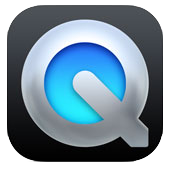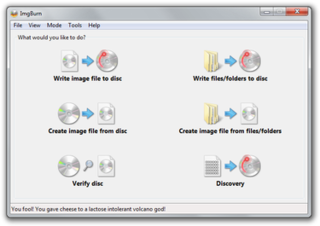
Adware, often called advertising-supported software by its developers, is software that generates revenue for its developer by automatically generating online advertisements in the user interface of the software or on a screen presented to the user during the installation process. The software may generate two types of revenue: one is for the display of the advertisement and another on a "pay-per-click" basis, if the user clicks on the advertisement. Some advertisements also act as spyware, collecting and reporting data about the user, to be sold or used for targeted advertising or user profiling. The software may implement advertisements in a variety of ways, including a static box display, a banner display, full screen, a video, pop-up ad or in some other form. All forms of advertising carry health, ethical, privacy and security risks for users.

QuickTime is an extensible multimedia framework developed by Apple Inc., capable of handling various formats of digital video, picture, sound, panoramic images, and interactivity. Created in 1991, the latest Mac version, QuickTime X, is available for Mac OS X Snow Leopard up to macOS Mojave. Apple ceased support for the Windows version of QuickTime in 2016, and ceased support for QuickTime 7 on macOS in 2018.
SourceForge is a web service that offers software consumers a centralized online location to control and manage open-source software projects and research business software. It provides source code repository hosting, bug tracking, mirroring of downloads for load balancing, a wiki for documentation, developer and user mailing lists, user-support forums, user-written reviews and ratings, a news bulletin, micro-blog for publishing project updates, and other features.
Matroska is a project to create a container format that can hold an unlimited number of video, audio, picture, or subtitle tracks in one file. The Matroska Multimedia Container is similar in concept to other containers like AVI, MP4, or Advanced Systems Format (ASF), but is an open standard.

VideoLAN is a non-profit organization which develops software for playing video and other media formats. It originally developed two programs for media streaming, VideoLAN Client (VLC) and VideoLAN Server (VLS), but most of the features of VLS have been incorporated into VLC, with the result renamed VLC media player.
Morpheus was a file sharing and searching peer-to-peer client for Microsoft Windows, developed and distributed by the company StreamCast, that originally used the OpenNap protocol, but later supported many different peer-to-peer protocols. On April 22, 2008, distributor StreamCast Networks filed for Chapter 7 bankruptcy after a long legal battle with music companies; all of their employees were laid off and the official download at www.morpheus.com stopped being available, though for a small period the website remained online. As of October 29, 2008, the official Morpheus website is offline, including all other websites owned by StreamCast Networks, specifically MusicCity.com, Streamcastnetworks.com and NeoNetwork.com.
The following comparison of video players compares general and technical information for notable software media player programs.

FileZilla is a free and open-source, cross-platform FTP application, consisting of FileZilla Client and FileZilla Server. Clients are available for Windows, Linux, and macOS. Both server and client support FTP and FTPS, while the client can in addition connect to SFTP servers.
PDFCreator is an application for converting documents into Portable Document Format (PDF) format on Microsoft Windows operating systems. It works by creating a virtual printer that prints to PDF files, and thereby allows practically any application to create PDF files by choosing to print from within the application and then printing to the PDFCreator printer.
Browser hijacking is a form of unwanted software that modifies a web browser's settings without a user's permission, to inject unwanted advertising into the user's browser. A browser hijacker may replace the existing home page, error page, or search engine with its own. These are generally used to force hits to a particular website, increasing its advertising revenue.

Zango,, formerly ePIPO, 180solutions and Hotbar, was a software company that provided users access to its partners' videos, games, tools and utilities in exchange for viewing targeted advertising placed on their computers. Zango software is listed as adware by Symantec, and is also labeled as a potentially unwanted program by McAfee. Zango was co-founded by two brothers: Keith Smith, who served as the CEO; and Ken Smith, who served as the CTO.

ImgBurn is an optical disc authoring program that allows the recording of many types of CD, DVD and Blu-ray images to recordable media. Starting with version 2.0.0.0, ImgBurn can also burn files and data directly to CD or DVD. It is written in C++. It supports padding DVD-Video files so the layer break occurs on a proper cell boundary.

Messenger Plus! is an add-on for Windows Live Messenger and Skype. The software provides additional functionality to Microsoft's Instant messaging client, Windows Live Messenger, by adding its own controls to the main interface. These controls affect Messenger's behaviour and appearance, often through additional dialog boxes.

K-Multimedia Player is an Adware-supported media player for Windows and iOS that can play most current audio and video formats, including VCD, HDML, DVD, AVI, MKV, Ogg, OGM, 3GP, MPEG-1/2/4, AAC, WMA 7, 8, WMV, RealMedia, FLV and QuickTime. KMPlayer shows many advertisements, including in the homepage, side panels, options panel, and as pop-up ads.
OpenCandy is an adware module and a potentially unwanted program classified as malware by many anti-virus vendors. They flag OpenCandy due to its undesirable side-effects. It is designed to run during installation of other desired software. Produced by SweetLabs, it consists of a Microsoft Windows library incorporated in a Windows Installer. When a user installs an application that has bundled the OpenCandy library, an option appears to install software it recommends based on a scan of the user's system and geolocation. Both the option and offers it generates are selected by default and will be installed unless the user unchecks them before continuing with the installation.

Simplified Universal Player Encoder & Recorder (SUPER) is a closed-source adware front end for open-source software video players and encoders provided by the FFmpeg, MEncoder, MPlayer, x264, ffmpeg2theora, musepack, Monkey's Audio, True Audio, WavPack, libavcodec, and the Theora/Vorbis RealProducer plugIn projects. It was first released in 2005. SUPER provides a graphical user interface to these back-end programs, which use a command-line interface.

μTorrent, or uTorrent is a proprietary adware BitTorrent client owned and developed by Rainberry, Inc. The "μ" in its name comes from the SI prefix "micro-", referring to the program's small memory footprint: the program was designed to use minimal computer resources while offering functionality comparable to larger BitTorrent clients such as Vuze or BitComet. μTorrent became controversial in 2015 when many users unknowingly accepted a default option during installation which also installed a cryptocurrency miner. The miner was removed in later versions, but had already done irreversible damage to μTorrent's reputation.
The Xbox system software is the operating system developed exclusively for the Xbox consoles. Across the four generations of Xbox consoles, the software has been based on a version of Microsoft Windows and incorporating DirectX features optimized for the gaming console. The user interface, the Xbox Dashboard, provides access to games, media players, and applications, and integrates with Xbox Live for online functionality.
A potentially unwanted program (PUP) or potentially unwanted application (PUA) is software that a user may perceive as unwanted or unnecessary. It is used as a subjective tagging criterion by security and parental control products. Such software may use an implementation that can compromise privacy or weaken the computer's security. Companies often bundle a wanted program download with a wrapper application and may offer to install an unwanted application, and in some cases without providing a clear opt-out method. Antivirus companies define the software bundled as potentially unwanted programs which can include software that displays intrusive advertising (adware), or tracks the user's Internet usage to sell information to advertisers (spyware), injects its own advertising into web pages that a user looks at, or uses premium SMS services to rack up charges for the user. A growing number of open-source software projects have expressed dismay at third-party websites wrapping their downloads with unwanted bundles, without the project's knowledge or consent. Nearly every third-party free download site bundles their downloads with potentially unwanted software. The practice is widely considered unethical because it violates the security interests of users without their informed consent. Some unwanted software bundles install a root certificate on a user's device, which allows hackers to intercept private data such as banking details, without a browser giving security warnings. The United States Department of Homeland Security has advised removing an insecure root certificate, because they make computers vulnerable to serious cyberattacks. Software developers and security experts recommend that people always download the latest version from the official project website, or a trusted package manager or app store.








